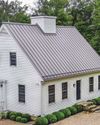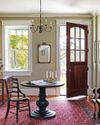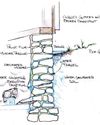
The conversion of unfinished attics to year-round living space has been a constant in American homes for centuries. Fitting out an attic, however, comes with its own set of constraints and a checklist of dos and don’ts. The first constraint is that attic walls typically slant at sharp angles, cutting down the amount of usable space. You may find a lack of headroom, most notably in low-pitched or gable-ended attics. An attic remodel usually will require flooring, sheathing for walls and ceilings, stair access, and dormers or windows. Then come such big-ticket items as structural support, insulation and venting, plumbing for a bathroom, heating and air conditioning, and electrical service. In essence, you’ll be building a little house in the attic. A good candidate for an attic conversion should be space free of obstructions with a ceiling height of at least 7' over much of the space.
A complex job is defined by what’s missing: adequate headroom in most of the space, say, or lack of a staircase (or limited room to add one on the floor below). The older the house, the more likely that renovation will require increased structural support. You may even need to raise the roof.
The simplest conversions are those where the attic already has adequate headroom, a floor (or subfloor), adequate light and window space, and access by way of a fixed stair. Chances are the joists under the floor will need reinforcement, the stair may not meet modern building codes, and livability will demand more windows than the required minimum. If walls and ceilings are clad in beadboard— a common treatment in the attics of many early-20th-century houses—that will need to be removed so that insulation and wiring can go in.
هذه القصة مأخوذة من طبعة January - February 2022 من Old House Journal.
ابدأ النسخة التجريبية المجانية من Magzter GOLD لمدة 7 أيام للوصول إلى آلاف القصص المتميزة المنسقة وأكثر من 9,000 مجلة وصحيفة.
بالفعل مشترك ? تسجيل الدخول
هذه القصة مأخوذة من طبعة January - February 2022 من Old House Journal.
ابدأ النسخة التجريبية المجانية من Magzter GOLD لمدة 7 أيام للوصول إلى آلاف القصص المتميزة المنسقة وأكثر من 9,000 مجلة وصحيفة.
بالفعل مشترك? تسجيل الدخول

Navigating the Lumberyard - Here's some lumber lingo you should know before you venture into a lumberyard.
Here's some lumber lingo you should know before you venture into a lumberyard. Almost everyone fixing an old house will end up at a lumberyard-whether it's a local supplier or the organized aisles of a big-box home-improvement store.

a farmhouse renewed
Sensitive renovations and restoration work preserved a house that dates to 1799.

AN OVERVIEW OF METAL ROOFING
METAL ROOFS ARE RESURGENT, FOR GOOD REASONS.

ENDURING BEAUTY IN WALLS of STONE
Now back in the family who had been here since 1830, the old farmhouse is again ready for generations to come. Additions dating to 1840 and the 1950s were preserved.

ARCHITECTURAL DETAILS COME TO LIFE
Owners and their designer celebrate the unique features of a 1912 Arts & Crafts Tudor.

For a Wet Basement Wall
If there's problem common to old houses, it's a wet basement. I'm not talking about occasional flooding, but rather a basement that apparently seeps or leaks after even a rain shower or during snowmelt. Several approaches are available; sustainable solutions will get to the root of the problem.

Patching a Plaster Wall
Fix a hole in the wall with a few common tools and some drywall supplies. Practice your technique!

Roofing & Siding
Make note of these historical and unusual materials for the building envelope.

The Riddle of the water
When water incursion happens, the roof isn't necessarily the culprit. Maybe snaking a drain line, or clearing debris from a clogged gutter, temporarily will stem a leak. But a recurring problem usually means other forces are at work. It takes persistence-and a team with the right skills and patience—to identify the source and apply a solution.

Light-filled Craftsman Redo
For a dark kitchen in a 1914 Illinois house, the trick was anchoring white expanses with woodsy warmth.